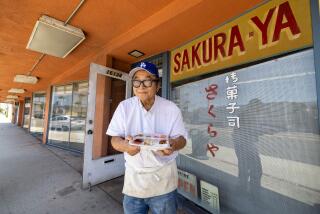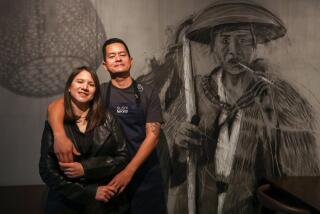Matchmaking Service in Japan : Store Helps Employees Shop for Mates
- Share via
OSAKA, Japan — Nichii, one of Japan’s largest supermarket chains, has a matchmaking department where its employees can seek a mate. It already has arranged 140 marriages.
“We want to nourish the hearts of our employees,” said Harue Nishibata, director of Nichii’s 21 Family Club. “That’s real social welfare.”
Nishibata, the widow of Nichii’s founder, said the service was inaugurated two years ago to mark the 20th anniversary of Nichii, which with 170 stores nationwide is Japan’s fifth-largest supermarket chain.
Scarcity of Eligible Men
Nichii’s women employees were having trouble finding mates, she said, because of a scarcity of eligible men. Of the company’s almost 9,000 full-time workers, its 3,400 women average 23 years old, and almost all are single. The 5,600 men are 10 years older on average, and most of them are married.
“Young women are also in a transitional stage,” Nishibata said. In this stage, she explained, families no longer exercise ultimate control over the choice of mates for children, but many women and men still need help in landing a partner.
The 21 Family Club sponsors ski tours, wine parties, boat rides, sports events and seminars, all designed to bring young couples together.
“We want to provide more than just a place to drink and dance,” Nishibata said in an interview. “We want our young people to get together to talk seriously about life and love.”
For those preferring a more direct approach, the club offers the more traditional o- miai, arranged introductions of young women to marriage-minded men.
The 16 women advisers at 21 Family Club office have extensive files from which to find a type of man who meets the qualifications--from salary and position to looks and hobbies--that a woman is searching for.
If the man agrees, the club sets up a meeting. Then the two parties, to avoid embarrassment, contact the office to say whether the first meeting warrants a second.
One-Third Arranged
Although most young Japanese today prefer to find their own partners, about one-third of all marriages are still the result of o-miai .
Nishibata said the club arranges 70 to 80 o-miai a month among its 2,800 members, made up primarily of young women from Nichii and single men from about 75 companies that do business with the supermarket chain.
The club also recently gave its members a wider choice by tying up with a matchmaking journal that has files on 9,000 unmarried people.
More to Read
Sign up for Essential California
The most important California stories and recommendations in your inbox every morning.
You may occasionally receive promotional content from the Los Angeles Times.










